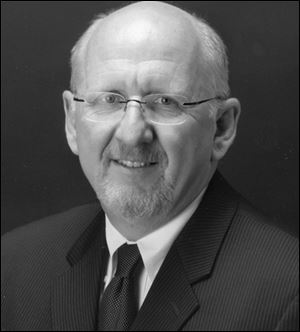
COMMENTARY
Japan disaster haunts region's new top nuclear cop
7/19/2012The U.S. Nuclear Regulatory Commission's new Midwest regional administrator is a former nuclear control-room operator who began working for the agency nearly 30 years ago. Until recently, he was the U.S. government's point man in Japan for all post-Fukushima disaster activities undertaken by this nation.
Charles "Call me Chuck" Casto is as plain-spoken a guy as you'll find in an agency known for its stiff collars and business suits. He could help raise the NRC's profile in its seven-state Midwest region, which includes 16 nuclear plants and 1,200 other facilities with nuclear licenses, such as universities and hospitals.
Davis-Besse and Fermi 2, operated by FirstEnergy Corp. and DTE Energy, respectively, are among the nuclear plants he oversees. Both are 30 miles from downtown Toledo and along the Lake Erie shoreline.
"I spent seven years in the industry; I grew up as an operator," said Mr. Casto, who also has worked overseas with the Paris-based International Energy Agency.

‘It was almost Biblical, monumental. It’s forever changed me, to be ever more dedicated to making sure a release like that never happens here.’ Charles Casto, referring to the Fukushima meltdown.
His well-rounded career includes time spent on Capitol Hill on an energy fellowship in the office of U.S. Sen. Harry Reid (D., Nev.). His former boss isn't high on the nuclear industry's Christmas card list.
But what distinguishes Mr. Casto's resume is the 11 months he spent in Japan, which began with orders to board a plane shortly after an earthquake-triggered tsunami overwhelmed that country in March, 2011. Meltdowns occurred to three of six reactors at Japan's Fukushima Daiichi nuclear complex.
Mr. Casto led the entire U.S. response team, not just the NRC contingent. At its peak, it consisted of about 150 government employees.
"No person has ever been faced with the challenges, the forces of physics and nature, that the Japanese were faced with, certainly not in peacetime," Mr. Casto said. He said he expected to be in Japan for only a couple of weeks, but stayed for nearly a year at the request of the U.S. and Japanese embassies.
Mr. Casto's recollection of Fukushima is horrifying. Scared people, many with respirators and protective clothing 20 miles from the accident scene, left a lasting impression on him. So did images of children's toys and coffee cups left where they were when the disaster occurred.
He thought: We can never let this happen in the United States.
"It was almost Biblical, monumental," Mr. Casto said. "It's forever changed me, to be ever more dedicated to making sure a release like that never happens here."
It's easy to be cynical about the NRC and its employees. The agency is an outgrowth of the old Atomic Energy Commission, which promoted nuclear power like an industry cheerleader until it was disbanded by Congress in the 1970s.
Some members of Congress believe the NRC has never shed that reputation. The NRC was blindsided by the near-rupture of Davis-Besse's original reactor head in 2002, an event the commission described as America's closest brush with nuclear disaster since the half-core meltdown of Three Mile Island Unit 2 in Pennsylvania in 1979.
As details of the Davis-Besse incident unfolded, one of Mr. Casto's predecessors, Jim Dyer, said the event had forced the NRC to do a "soul-searching." NRC management uses the mishap as a reminder of what can happen when inspectors get complacent.
Fermi 2 is one of 23 U.S. reactors with a General Electric Mark 1 design similar to those that melted in Japan. Early in his career, Mr. Casto worked at four other units with that design -- two as an operator and operations instructor at the Browns Ferry complex in Alabama, and two as an NRC instructor at the Brunswick site in North Carolina.
Nuclear power is an important part of America's energy mix. It generates 20 percent of the nation's electricity. Ounce for ounce, no fuel source on Earth provides more energy than the thumbnail-sized uranium pellets packed into nuclear fuel rods. The challenge is to harness it in the safest and most effective way.
Mr. Casto's appointment hasn't made the NRC's job any easier. He's one guy in an agency with a Herculean task.
Still, it's nice to know that the Midwest region's top nuclear cop is a plain-spoken guy who had his eyes opened by what happened in Japan.
Tom Henry is an editorial writer and columnist for The Blade.
Contact him at: thenry@theblade.com